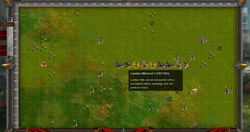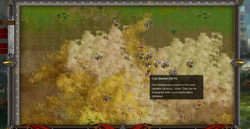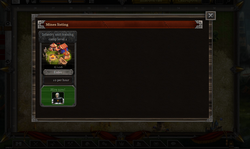Map Mines
Map mines and Mercenary camps are places where resources, Credits or army are accumulated. They appear on the map and disappear when they are depleted. When they appear mines and mercenary camps are no one’s property. They become the property of any player who makes a successful attack on them. When a player owns a map mine or mercenary camp it produces resources, Credits or army for the player to take. When the resources, Credits or army in a map mine or mercenary camp are depleted it disappears from the map. Map mines and mercenary camps, appear a couple of days after the round has begun. When this happens they are owned by no one and a player must attack them successfully in order to acquire them.
Once you have acquired a map mine or mercenary camp you can protect it by transferring army there or by sending a support march. Note that you can only support your own mines and mercenary camps. If an enemy defeats your defenses and/or support they become owner of the mine or mercenary camp.
 Each mine has a certain amount of resources or Credits in it. Whenever a player owns a mine it produces resources or Credits at a certain hourly rate. Each unit of resources or Credits produces is deducted from the total amount of resources or Credits that the mine has. When all the resources or Credits in a mine have been depleted it disappears and all armies in it or traveling to it return to their home Castle.
Each mine has a certain amount of resources or Credits in it. Whenever a player owns a mine it produces resources or Credits at a certain hourly rate. Each unit of resources or Credits produces is deducted from the total amount of resources or Credits that the mine has. When all the resources or Credits in a mine have been depleted it disappears and all armies in it or traveling to it return to their home Castle.
 The produced resources or Credits at the mine appear once every half an hour. Whenever there are produced resources or Credits waiting at a mine, a player can take them at any time and at any Castle. Note that a mine has the storage capacity to hold 3 hours’ worth of production. This means that if you don’t take the accumulated resource or Credits for 3 hours, the mine will stop production until the accumulated resources or Credits are taken.
The produced resources or Credits at the mine appear once every half an hour. Whenever there are produced resources or Credits waiting at a mine, a player can take them at any time and at any Castle. Note that a mine has the storage capacity to hold 3 hours’ worth of production. This means that if you don’t take the accumulated resource or Credits for 3 hours, the mine will stop production until the accumulated resources or Credits are taken.
Note that when a mine changes its owner all the resources or Credits, accumulated and waiting to be taken, are lost.
There are 5 types of mercenary camps: for infantry, for cavalry, for archers, for siege machines and for special units (no Noblemen). Each type produces, a random unit from its category. For example, a Infantry camp produces only Swordsmen at a time and not all infantry types.
 Each Mercenary camp has a certain amount of army in it. Whenever a player owns a Mercenary camp they can take the army from it by training army. For this army, players have to pay with resources at a price equal to the particular unit's price at a castle. When all the army in a mercenary camp has been depleted it disappears and all defending armies in it or traveling to it return to their home Castle.
Each Mercenary camp has a certain amount of army in it. Whenever a player owns a Mercenary camp they can take the army from it by training army. For this army, players have to pay with resources at a price equal to the particular unit's price at a castle. When all the army in a mercenary camp has been depleted it disappears and all defending armies in it or traveling to it return to their home Castle.
There is a limitation on the amount of map mines and mercenary camps a player can possess at a certain time. This limitation depends on the levels of the Castle building in all a player’s castles.
Here is a table showing how much mines each Castle building allows, depending on its level:
- Castle lv 1-2: 1 map object possible
- Castle lv 3-4: 2 map objects possible
- Castle lv 5-6: 3 map objects possible
- Castle lv 7-8: 4 map objects possible
- Castle lv 9-10: 5 map objects possible
Note that if you have more than one Castle, the amount of objects that each one allows are combined to form the overall maximum.
For example: if you own 3 Castles, one at level 2, one at level 5 and the last one at level 10. This means that according to the table above, you will be able to own 1 + 3 + 5 = 9 map objects in total.
You can send attack campaigns to mines or mercenary camps to conquer them.
You can also send transfer and support marches to protect them.
Map mines and mercenary camps can be spied on.